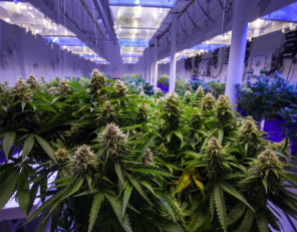 By Miriam Raftery
By Miriam Raftery
Updated September 24 with statement from CASA opposing the measure
September 23, 2019 (La Mesa) – Is it high time to legalize recreational adult-use cannabis sales, commercial cultivation, manufacturing, testing and delivery in La Mesa? If so, should revenues be used to help property owners near illegal pot shops that caused problems for neighbors? Those are among the burning issues on the La Mesa City Council’s agenda this Tuesday.
The city’s Cannabis Subcommittee, composed of Mayor Mark Arapostathis and Councilman Bill Baber, has proposed allowing adult-use cannabis businesses, subject to certain restrictions. The goal is to drive illegal dispensaries out of the city and assure that products are regulated by the state, reducing risks to consumers from products sold on the black market while honoring voters wishes.
“A regulated, well run, clean environment will be much better than the shady places," Baber told ECM in an interview earlier this year. He indicated that he also respects the "will of the voters" in California and La Mesa. Statewide, voters approved legalizing use of adult-use cannabis, or marijuana, last year. At the same time, La Mesa voters approved an initiative to tax both medical and recreational cannabis products.
The proposal comes at a time when black market vaping products containing THC, the active ingredient in cannabis, have been linked to several deaths and hundreds of cases of serious lung damage nationwide. Baber says he believes health concerns over vaping should be addressed separately from the adult-use cannabis issue.
However, the draft ordinance to allow adult use cannabis businesese to co-locate with medical marijuana faicilities approved under Measure U has drawn opposition. In a September 14, 2019 letter to the City Council, Community Action Service & Advocacy (CASA) states:
"We understand that the City of La Mesa is required to follow measure U, but by adding adult-use co-location the city is expanding the volume of commercial operations."
Allowing commercial marijuana store fronts will not eliminate or even reduce the black market for marijuana, CASA contends. "In 2010 the County Board of Supervisors approved an ordinance to allow medical marijuana storefronts. They, too, thought it would make it easier to distinguish from and push out the black market. Instead, by 2013 illegal operators outnumbered licensed operators 100/1. Attempts to shut down illegal operators was nothing more than a game of whack-a-mole. Fines for illegal operations were merely the cost of doing business, not a deterrent. By 2017 the County changed course and voted to repeal their ordinance, giving 5 years for licensed operators to close their doors."
CASA also raised concerns about the potential to increase crime. The organization's letter notes: "Legal marijuana shops are linked to higher levels of crime in areas nearby according to a three-year study in Denver. The study found crime isn’t higher in the area immediately surrounding marijuana commercial operations, but adjacent areas saw about 84 more property crimes per year than neighborhoods without nearby marijuana stores. https://link.springer.com/article/10.1007/s10935-017-0472-9
Addiction is another concern. According to CASA, "A recent study published in the Society for the Study of Addiction https://rdcu.be/bKrf8 showed a strong association between young adult marijuana use and addiction, and the availability of commercial outlets and storefront signage. Where there are more stores and more storefront signs there is more use, abuse and addiction."
CASA also objects to language in both measure U and the proposed ordinance which requires a 1,000 ft. buffer between cannabis storesfronts and sensitive use or child oriented facilities. "Measure U uses a door to door measurement. We are already seeing commercial marijuana owners proposing to construct barriers to create a one-thousand-foot door to door measurement. Why expand a bad, poorly written law, with which the city is forced to comply?" CASA's letter concludes, "The cities’ obligation to protect the health and safety of the community must take priority over the interests of commercialized marijuana operation."
The agenda also includes a proposal for revitalization grants for properties adjacent to former illegal dispensary sites, utilizing revenues from budding new legal cannabis businesses. The measure is proposed by Councilmembers Bill Baber and Kristine Alessio.
“We had a West La Mesa activist show me a few sites where we (the city) closed down illegal dispensaries. The neighborhood degraded around these illegal sites,” Baber told ECM in an email. “He wanted some help from the city in revitalizing the neighborhood. I thought it was a reasonable nexus to use legal cannabis tax profits to improve neighborhoods degraded by illegal cannabis dispensaries. It’s a pilot program.”
Another proposed pilot program put forward by Councilmembers Alessio and Akilah Weber would establish a pilot micro-grant program for businesses in the west La Mesa area.
The Council agenda also includes consideration of approving La Mesa Village Enhancement Fund Program guidelines, as well as a second reading of an ordinance authorizing a community choice energy program.
The meeting will be held at 6 p.m. Tuesday at City Hall at 8130 Allison Avenue, in the Council Chambers.
View full agenda and attachments with details on each proposal at https://www.cityoflamesa.us/AgendaCenter/ViewFile/Agenda/_09242019-883?html=true
 By Miriam Raftery
By Miriam Raftery














Comments
Legalize
Treat the weed like alcohol and tobacco, tax it and use some of the revenue to help pepole with dependency issues. Take the profits away from drug cartels.